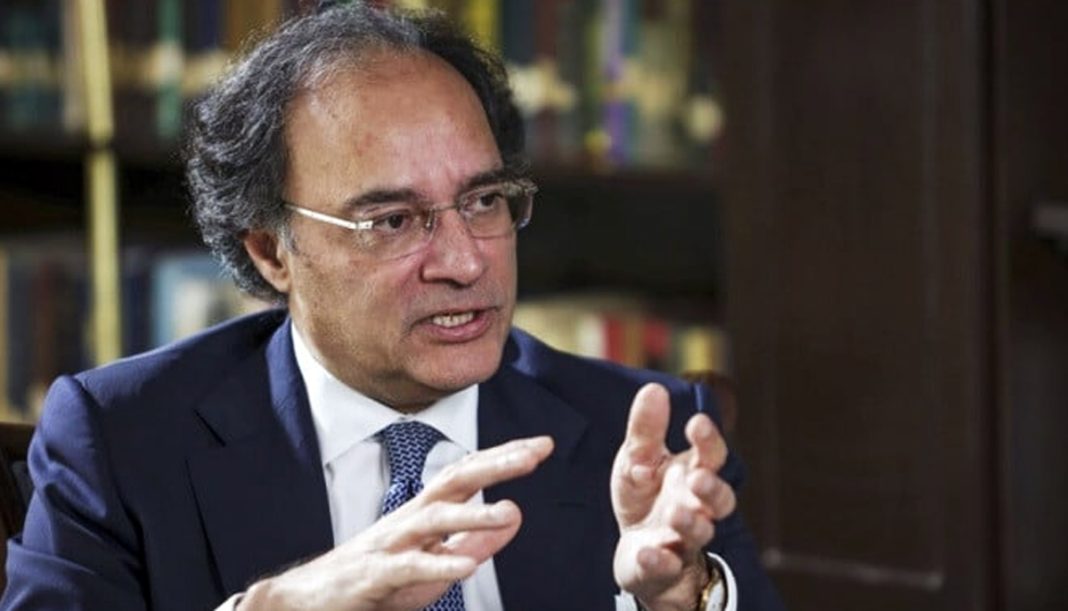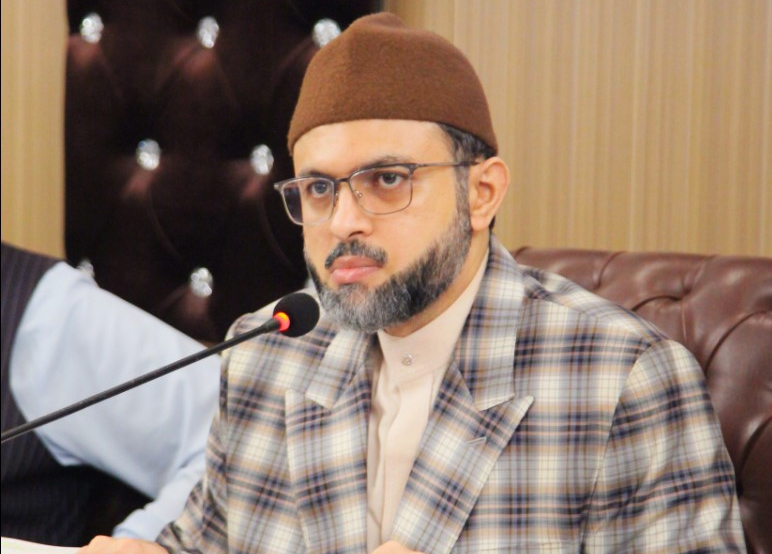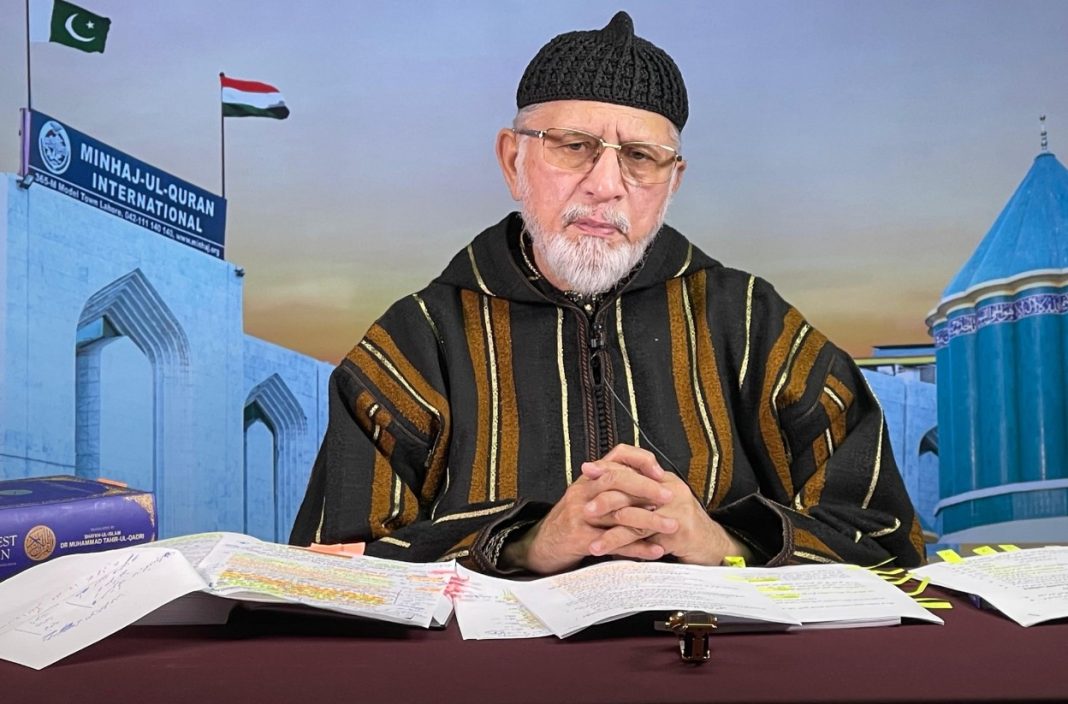Federal Finance Minister Senator Muhammad Aurangzeb, while describing the International Monetary Fund (IMF) agreement as a confirmation of economic stability, has said that the agenda of fundamental reforms is being followed and fundamental reforms are indispensable for sustainable economic stability. He also claimed that the economy will improve due to the reduction in interest rates.
Senator Muhammad Aurangzeb was holding a press conference in Islamabad along with Chairman FBR Rashid Mahmood Langrial, Minister for Energy Owais Leghari, and Minister for IT Shaza Fatima.
The Federal Finance Minister said that economic stability has come to the country, we have done important work related to macroeconomic stability, our goal is to ensure sustainable economic stability, reforms are indispensable for sustainable economic stability.
He said that the government is pursuing an agenda of fundamental reforms in the economy, international rating agencies have acknowledged Pakistan’s economic stability, and the staff-level agreement with the IMF is also a confirmation of economic stability.
Muhammad Aurangzeb said that our economic direction is correct, the reduction in the policy rate has had a positive impact on the economy, reforms are being brought in other sectors including the tax system, energy, and pension reforms, right sizing are also part of the fundamental reforms.
Read More: Semiconductor project is very important, youth should be taken further ahead, PM
‘FBR does not need to impose more taxes’
The Chairman FBR said that this year, income tax returns have increased by 18 percent, the number of taxpayers has increased to 5.9 million, and the FBR does not need to impose more taxes.
He said that the rate of submission of individual tax returns has increased, tax collections have increased due to effective measures, and the FBR has the support of all institutions.
He said that for the first time, the tax-to-GDP ratio has increased by 1.5 percent, the measures approved in the tax-related budget are being implemented, the Prime Minister chairs a meeting on tax reforms on a weekly basis.
Rashid Langrial said that tax reforms require time, we have to take tax reforms to 18 percent of GDP in the next 3 to 4 years, which will also include the cooperation of the provinces and in this, the federal cooperation will be 13.5 percent which will come from the FBR and 1.15 percent will come from the PDL, that is, 15 percent will come from the federation and 3 percent from the provinces.
He said that the federation has to increase by 3.52 percent in the next 3 years, but the provinces have to increase by 2.15 because the base of the provinces is .85, in which it is very difficult to add 2.15, compared to the federation which is currently at 10 percent, it needs to increase by 3.5 percent.
He said that the cooperation of the institutions I talked about was actually a huge gap in the drug sector. When our team went to them, they were intimidated and threatened. And now, two of our people have been martyred in the Kohat tunnel. That is why we are afraid because our job is not to fight and our training is not like that. Our main job is to comply with tax laws or enforce tax payment rules. Now we have the support of other institutions including the Rangers, due to which all this is becoming possible.
‘Now the government will not buy electricity’
Federal Energy Minister Owais Leghari said that we inherited very expensive electricity and there were many reasons for this, while our hands are still tied, but despite this, the price of electricity has been reduced by Rs. 10.5 per unit in the last 18 months.
Read More: Nepra reduces K-Electric’s tariff by Rs 7.60, decision issued
He said that wherever we got the opportunity, we had surplus power, we made a 3-month package and started providing the industry with Rs 26 per unit, while the EV rate was reduced from Rs 71 to Rs 39 per unit, while the reduction for industries was Rs 16 per unit.
He said that the energy sector is being developed on modern lines, billions of rupees have been saved by solving technical problems in the energy sector, and Rs 48 billion have been saved by auctioning loss-making production units.
The Federal Minister said that the Ministry of Finance helped us a lot in the agreement with the IMF, after we struggled for 8 to 9 months, I told the Finance Minister that we have 7,000 megawatts of surplus electricity, I cannot keep it in a locked cupboard, so I took his permission and made the price of electricity per unit for consumers the same as what we are getting.
He said that this cabinet has done what every government was trying for 20 years, that is, the government will no longer buy electricity, it has come out of this business, people will have to buy and sell electricity among themselves, which will get them the best prices, no bigger reforms can come in Pakistan’s energy sector than this and will never come.
The Energy Minister said that this was a burden on us because we were paying additional salaries of 7 billion to maintain dead plants, we auctioned these plants and so far 17 units have been auctioned, 48 billion rupees were taken by a government agency and 9 billion rupees by the private sector.
He said that an effective plan has been made to eliminate circular debt. We are working on a plan to eliminate circular debt of Rs 1.2 trillion, in which the Ministry of Finance has provided us with support. In the next 6 years, this circular debt will be eliminated without putting any additional burden on the consumers, while in the next 3 years, the entire electricity system will be on automated metering. In automated metering, prepaid facilities will also be available to consumers.
He further said that we reduced the circular debt by Rs 700 billion in one year, and this was not only due to the reduction in interest rates or negotiations, but we reduced this by reducing the losses of distribution companies and these reforms came through good governance.
Owais Leghari said that we reduced the loss of Rs 193 billion in one year and out of this, only Rs 80 billion was the annual loss from the tube wells of Quetta Electric Company where 27,000 tube well owners used to use electricity but did not pay the bills. On this, the federation invested Rs 38.5 billion and the province invested Rs 16.5 billion and in the same year we will be able to recover Rs 40 billion, meaning whatever investment we had on solarization will be recovered in one year.
Read More: Prime Minister’s visit: Agreement to send 150,000 skilled workers from Pakistan to Belarus
‘Government is ensuring transparency in the privatization process’
Advisor to the Prime Minister on Privatization Muhammad Ali said that there are many reasons for the lack of privatization of institutions in the last 20 years, the main reason being the lack of commitment from the top leadership, but today the Prime Minister is paying special attention to it.
He said that work is underway on rightsizing, consultation with the relevant ministries is being ensured in rightsizing, the final approval of rightsizing of a department is given by the cabinet.
He said that the capacity of the Privatization Commission is being increased, the government is ensuring transparency in the privatization process and is ensuring that no monopoly is established after the privatization of institutions.
The privatization advisor said that First Women Bank was sold for Rs 5 billion, which was criticized for giving seed money for only Rs 5 billion, so I would like to remind you that there was a bank in our country, SME Bank, which was not sold due to which it had to be closed, because small banks have many issues and the total equity of this bank was Rs 3 billion.
He said that the government is committed to achieving its goals regarding privatization, the services of financial experts are being sought in privatization, while the privatization process will accelerate in the coming period.
He said that the privatization process of PIA is very important, for which 4 groups are currently involved, Fauji Foundation, Airblue, Lucky Cement and Arif Habib Group, while the privatization process of DISCOs has started with ISCO, LESCO, FESCO.
‘54,000 vacancies have been eliminated’
The Prime Minister’s Coordinator for Rightsizing Salman Ahmed said that work on rightsizing is ongoing, consultation with the relevant ministries is being ensured in rightsizing, the final approval for rightsizing a department is given by the cabinet.
He said that 20 ministries have gone through the rightsizing process, 54,000 vacancies have been eliminated, while PASSCO, which is a loss-making institution, will be eliminated.
‘We are creating a digital exchange at the national level’
Federal Minister for Information Technology Shaza Fatima said that on the one hand, we have digital exports, but looking at the impact of digitization on the economy, we thought about how to bring an impact of 10 billion dollars in the next 4 years.
He said that we are moving towards a cashless economy, for which the Digital Nation Pakistan Act was passed in January this year, which gave a complete roadmap that has 3 aspects, digital society, digital economy and digital government, i.e. how to bring digitization in the government process, our economy and society.
The Federal Minister said that the Prime Minister formed 3 committees in the meeting on cashless economy, the first committee is headed by the Governor of the State Bank, the second committee is headed by myself and the third is related to the money paid by the government to the public or the public to the government, overall they are being headed by the Federal Minister of Finance.
He said that Digitization Nation Pakistan is following the roadmap, creating a digital exchange at the national level in which all institutions including the FBR will be connected, while all government institutions will work in one place on the digital exchange layer.
He said that a comprehensive system is being introduced in an integrated manner for a cashless economy. Digitization has an important role in increasing the tax net and increasing collections. Now people will not be able to hide their transitions.
Shaza Fatima said that direct payment has made the digital payment process easier. People will no longer have to stand in queues to pay and transfer money. In addition, digitization will bring transparency and save time.
He said that a World Bank report shows us that if we adopt 10 percent digital payments, there is an increase in GDP growth of about one percent. That is, if our adoption increases by 10 percent, we see a GDP of 400 billion, and an increase in GDP of 40 billion rupees.




